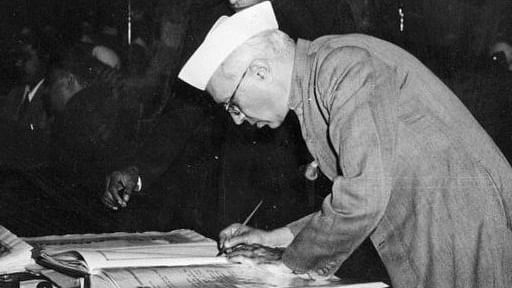
What is India beyond its geography? When we chant Bharat Mata Ki Jai, who are we considering as Bharat Mata? These are the few poignant questions asked in the opening episode of Shyam Benegal’s Bharat ek Khoj.
The 53 episode series is Benegal’s attempt at capturing the India’s first Prime Minister Pandit Jawaharlal Nehru's perspective and understanding of India.
Bharat ek Khoj is an adaptation of Nehru's book Discovery of India.
Also Read—Telling stories of independence
Nehru is a controversial personality in today’s India. There are divided opinions dissecting his policies and regime, however, Discovery of India reveals his astute writing skills and his outlook on the much debated topics like nationalism.
The Plot
Shyam Benegal had the mammoth task to bottle down the academic excellence showcased by Nehru to something relatable to every household. Benegal executes it with almost near perfection.
In the opening sequence, Rohan Seth, who is playing the character of Nehru while conversing with the people in the village can be seen asserting the fact that irrespective of the rivers, the land, the field , India’s identity is its ‘awaam’ , the people and the concept of India disappears the moment we don’t realize it. That remains the essence of the series throughout.
The series which initially was telecasted in Doordarshan on Sundays at 11 am during the year 1988-89, and has 30-50 minutes long episodes giving an extensive trajectory of India starting from the Harappan civilisation to the Mughal era to the episode towards the end named Separatism which focuses on the events that paves the way to the sentiments of separation based on religion. This episode also gives you a precursor to partition.
The episodes deep dive into the aspects that are core to India, and one can see the discourses around these topics prevalent in the present India. It explores a list of topics like the Indus valley civilisation, the four vedas, Mahabharat, Ramayan, Vijayanagara Empire, Mauryan empire, Maratha rule, Emperor Asoka, the Mughal era, Akbar, the British rule, independence movement, Mahatma Jyotiba Phule, the caste system.
Benegal ensures these topics remain engaging as well as nuanced.
The Lacunas in the plot
Though historians will find gaps in the date line and finer details. However, the fact that Nehru wrote the book in Ahmednagar Jail after the Quit India Movement based on the details in his mind and with help from his cellmates Maulana Azad, Govind Ballabh Pant, Narendra Deva, M Asaf Ali and that makes Bharat Ek Khoj an attempt of looking at India through Nehru’s prism rather than a historically accurate journey of the country.
Another critique the Nehru’s Bharat ek Khoj faces is the absence of BR Ambedkar and his role in addressing the caste issue plaguing India. Nehru touches the caste issue but ends up not mentioning one of the prominent personalities who brought the issue to the mainstream.
A milestone in Indian cinema
Shyam Benegal, who has given one of the finest movies to the Indian cinema, has established his craft when it comes to capturing the essence of India in movies like Manthan, Bhumika, Junoon Kalyug. For Bharat Ek Khoj, Benegal brought a stellar cast of 500 most refined actors to bring Nehru's vision of India to life. This list included Naseerudin Shah, Shabana Azmi, Om Puri, Ila Arun, Pallavi Joshi, Lucky Ali, Irfan Habib, Surekha Sikhri, Piyush Mishra, Pankaj Kapur, Sadashiv Amrapurkar.
Benegal understood the importance of a team that can do intense research and make this piece of art memorable for the generations to come. The writers and advisors for Bharat ek Khoj included Shama Zaidi, Sunil Shanbag, Vasant Dev, Irfan Habib, RS Sharma with more than 20 historians working in the background.
Not a blind adaptation
One of the crucial points about Bharat Ki Khoj is that Benegal steered it away from being a simple adaptation of Nehru's book, and layered it with critique.
Om Puri, who acts as a narrator from the background balances the views of Nehru or acts as a critiquing viewpoint of the adaptation.
Bharat ek Khoj is a milestone to Shyam Benegal’s cinematic prowess. He achieved something that might seem impossible in present day India. He dealt with complex topics, multiple historical characters giving us a gem that needs to be celebrated.